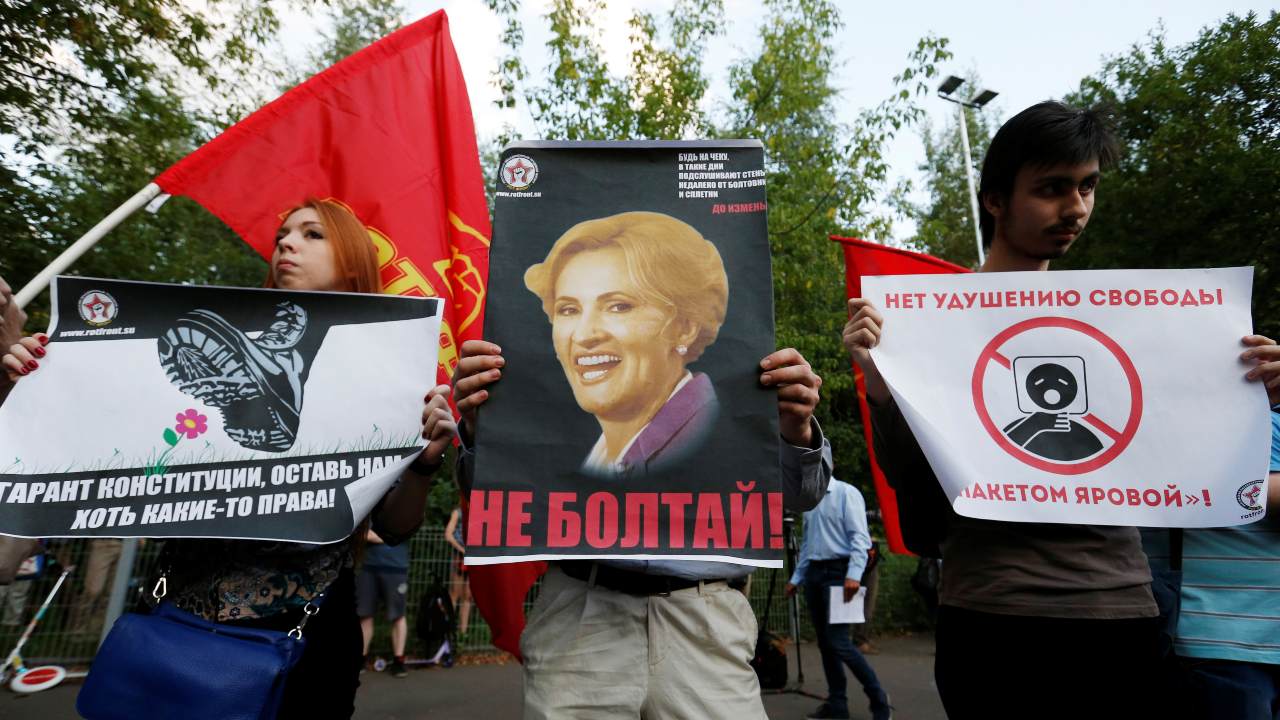As Russia sends tanks and soldiers to take over Ukraine, it is also dispatching censors and regulators to strangle the Internet. In this special series by the Center for European Policy Analysis, The New Iron Curtain, Senior Fellows Andrei Soldatov and Irina Borogan argue that both invasions are linked and represent the culmination of more than a decade-long trend to throttle the free and open flow of information in Russia.
In Moscow, Internet regulator Roskomnadzor established a central control office at Derbenevskaya Embankment 7 in a renovated 19th-century red-brick building. Called the Center for Monitoring and Control of Public Communications Networks, it counts a staff of 70. Sergey Khutortsev, a former Russian security services officer, became the director.
Rozkomnadzor required Internet service providers to install filters. The ISPs blocked forbidden websites. A Russian organization replaced Internet registrars, assuming control over the Internet registrar and controlling who could host a website. A Russian Domain Name System (NSDI) took over the functions of the global DNS (Domain Name System). Russian Internet service providers are required to provide data on cross-border data transfers and Internet exchange points.
Foreign technology helped build the system. Rozkomnadzor’s monitoring center relies on 30 servers supplied by Chinese-owned Lenovo and 30 more from US company Super Micro Computer Corp. Throughout the country, Roskomnadzor provided Russian Internet services providers with Deep Packet Inspection, supplied by the Israeli firm Silicom Ltd. The Israeli firm sold the devices to RDP.ru, part of Rostelecom, which, under orders from Rozkomnadzor’s censorship center, distributed the technology.
Most digital inspection tools look at the “headers” on a packet of data—where it’s going and where it came from. Intrusive Deep Packet Inspection, a Western technology, filters the entirety of Internet traffic. It allows network providers to peer into the digital packets of the message, reading detail like the website a user is visiting or the content of unencrypted messages. “You open the envelope, rather than not just reading the address on a letter,” explains an engineer dealing with Deep Packet Inspection.
Roskomnadzor’s censorship center not only monitors traffic. It suppresses entire websites– in a particular region or in the entire country. Since the beginning of 2021, Roskomnadzor has demanded that Internet service providers switch to the National Domain Name System (NSDI), as a replacement for the global internet domain system. At the end of 2021, the system controlled 73 percent of overall Internet traffic and 100 percent of the country’s mobile phone traffic.
In June 2021, Roskomnadzor began blocking VPN services that circumvent local restrictions. Opera VPN, a major service, ceased to work, and the company stopped providing service in Russia. In the following months, Roskomnador blocked six additional VPN services.
Roskomnadzor also moved to suppress Tor – encryption software that permits users to bypass locally imposed web restrictions and keeps their searches private. An estimated 300,000 Russians depend on Tor, or about 15 percent of Tor users worldwide. Roskomnadzor announced the blocking in a statement about “the introduction of centralized management in relation to the means of circumventing the restriction of information prohibited by law.”
For Russian censors, Tor represents a powerful symbol. While most technologies designed to avoid censorship were commercial tools, Tor was a political project, developed in the mid-1990s at the US Naval Research Laboratory. In the mid-2000s, the US military released Tor’s code, and the NGO Electronic Frontier Foundation funded Tor developers to continue the project. The Kremlin perceived Tor as a technology developed and maintained by democratic countries to help activists.
Tor long seemed unbeatable, even in Russia. Back in 2014, Moscow challenged the service, offering 3.9 million rubles ($86,000) for research on cracking the software. The effort failed. But Deep Packet Inspection overcame Tor’s formidable defenses. With Russia’s new Internet Curtain in place, the stage was set for a showdown with Silicon Valley’s technology titans.
Andrei Soldatov is a nonresident senior fellow with the Center for European Policy Analysis. Andrei is a Russian investigative journalist, co-founder, and editor of Agentura.ru, a watchdog of the Russian secret services’ activities. He has been covering security services and terrorism issues since 1999.
Irina Borogan is a nonresident senior fellow with the Center for European Policy Analysis. Irina is a Russian investigative journalist, co-founder, and deputy editor of Agentura.ru, a watchdog of the Russian secret services’ activities.
Bandwidth is CEPA’s online journal dedicated to advancing transatlantic cooperation on tech policy. All opinions are those of the author and do not necessarily represent the position or views of the institutions they represent or the Center for European Policy Analysis.





